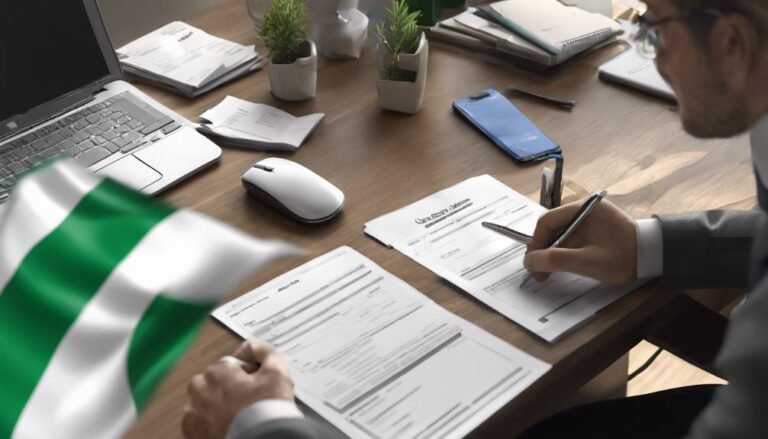Financial Planning and Budgeting Tips in Ireland
In Ireland, establish financial stability by setting clear monetary goals and optimizing spending habits. Create a roadmap with specific savings objectives and regularly evaluate income and expenses. Prioritize spending based on goals, diligently track expenses, and make necessary budget adjustments. Build an accessible emergency fund to cover unexpected costs and contribute regularly for security. Develop a strong investment portfolio aligned with long-term goals, ensuring diversification and utilization of tax-efficient retirement accounts. Mastering financial planning and budgeting techniques is essential for securing your financial future and aspirations.
Key Takeaways
- Set clear financial goals to guide budgeting and planning.
- Track expenses meticulously to identify areas for savings.
- Establish an emergency fund with 3-6 months' living expenses.
- Invest in a diversified portfolio aligned with long-term goals.
- Utilize tax-efficient retirement accounts for retirement planning.
Importance of Financial Planning
Financial planning plays an essential role in securing your financial future by providing a roadmap for achieving your monetary goals in Ireland. Setting savings goals and planning for retirement are critical aspects of this process. Establishing specific objectives for saving money helps you work towards financial stability.
Whether you aim to build an emergency fund, save for a major purchase, or invest for your retirement, having a clear savings goal provides motivation and direction for your financial decisions.
Retirement planning is another important component of financial planning in Ireland. Planning for retirement involves evaluating your current financial situation, determining how much you need to save for retirement, and selecting appropriate retirement accounts or investment vehicles. By creating a retirement plan, you can make sure that you have enough funds to support your lifestyle after you stop working.
Additionally, considering factors like inflation and healthcare costs in your retirement planning can help you be better prepared for the future. By incorporating savings goals and retirement planning into your financial strategy, you can work towards a secure and stable financial future in Ireland.
Creating a Realistic Budget
Regularly evaluating your income and expenses is crucial when creating a realistic budget in Ireland. Tracking expenses meticulously allows you to understand where your money is going and identify areas where you can cut back or save. Setting clear financial goals is equally important as it gives you a sense of direction and purpose for your budget.
To help you visualize the budgeting process, consider the following table that outlines a sample budget template:
| Category | Monthly Budget |
|---|---|
| Housing | €800 |
| Transportation | €150 |
| Groceries | €250 |
| Utilities | €100 |
| Entertainment | €50 |
Managing Expenses Wisely
To effectively manage your expenses in Ireland, it's essential to prioritize your spending based on your financial goals and needs. One vital aspect of managing expenses wisely is tracking your expenditures. By diligently recording all your expenses, you can gain a clear understanding of where your money is going and identify areas where you can cut back or adjust your budget.
Once you have a detailed view of your expenses, it's important to make necessary budget adjustments. This may involve reallocating funds from non-essential categories to prioritize your financial goals.
Implementing saving strategies is also key to managing expenses effectively. Consider setting up automatic transfers to a savings account or exploring investment opportunities to grow your wealth over time.
Moreover, practicing smart spending habits can have a significant impact on your financial well-being. This includes comparison shopping, avoiding impulse purchases, and seeking out discounts or promotions whenever possible.
Building an Emergency Fund
When planning your finances in Ireland, one important aspect to keep in mind is building an emergency fund to protect yourself from unforeseen expenses. Savings strategies play a critical role in establishing this financial safety net. It's recommended to set aside at least three to six months' worth of living expenses in your emergency fund.
This fund should be easily accessible, such as in a high-yield savings account, to make sure you can quickly access the funds when needed.
Emergency preparedness is key in safeguarding your financial stability. By having an emergency fund, you can cover unexpected costs like medical emergencies, car repairs, or sudden unemployment without derailing your long-term financial goals.
Make it a priority to regularly contribute to your emergency fund, even if it means starting with small amounts and gradually increasing your savings over time. Remember, the goal is to have a financial cushion that provides peace of mind and security in times of crisis.
Investing for the Future
Building a strong investment portfolio is essential for securing your financial future in Ireland. When considering investing for the future, it's vital to develop clear investment strategies that align with your long-term goals, such as retirement planning.
Diversification is key in spreading risk and maximizing returns. By investing in a mix of stocks, bonds, and other assets, you can mitigate potential losses and enhance overall portfolio performance.
Retirement planning should be a central focus when investing for the future. Start by determining how much you need to save for retirement and the timeframe you have to achieve this goal. Consider utilizing tax-efficient retirement accounts like Personal Retirement Savings Accounts (PRSAs) or occupational pension schemes to benefit from tax advantages while saving for retirement.
Regularly review and adjust your investment strategies as needed to stay on track with your financial objectives. Seek guidance from financial advisors or investment professionals to make sure your investment decisions are well-informed and aligned with your future financial goals.
Frequently Asked Questions
What Are the Common Pitfalls to Avoid in Financial Planning?
When planning finances, avoid pitfalls like neglecting an emergency fund. Understanding the significance of saving for unexpected events is vital. Additionally, be mindful of overspending and break these habits to guarantee a stable financial future.
How Can I Stick to My Budget During Unexpected Expenses?
When unexpected expenses arise, focus on building an emergency fund to cover them. Prioritize savings by allocating a portion of your income each month. This proactive approach will help you stick to your budget and navigate financial challenges effectively.
Is It Better to Focus on Paying off Debt Before Saving?
When deciding between paying off debt or saving, prioritize finances wisely. Start by tackling high-interest debt to avoid accruing more interest. Once debt is manageable, focus on saving to build a financial cushion for unexpected expenses.
What Are Some Creative Ways to Reduce Daily Expenses?
To reduce daily expenses, consider DIY projects for home repairs and meal planning to cut down on food costs. Utilize couponing and second-hand shopping to save money on purchases. These strategies can help you manage your budget effectively.
How Can I Choose the Right Investment Options for My Future Goals?
When selecting investment options for your future goals, it's crucial to begin by evaluating the risks involved and ensuring diversification. Consider balancing long-term objectives with short-term gains to build a robust and adaptive portfolio.
Conclusion
As you navigate the waters of financial planning and budgeting in Ireland, remember that your financial journey is like a ship sailing towards a prosperous future.
By creating a realistic budget, managing expenses wisely, building an emergency fund, and investing for the future, you're setting sail towards financial stability and success.
Keep steering your financial ship in the right direction, and soon you'll reach the shores of financial freedom and security.
Bon voyage!








